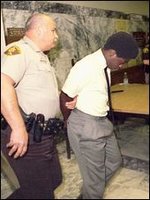 the seattle pi has a thought-provoking story today about willard jimerson jr., who at the age of 13 was sentenced as an adult to 23 years in prison for shooting and killing a 14-year-old girl. caught up in the moral panic over a new generation of juvenile “superpredators” in 1994, jimerson was one of the youngest people in washington state’s history to stand trial as an adult.
the seattle pi has a thought-provoking story today about willard jimerson jr., who at the age of 13 was sentenced as an adult to 23 years in prison for shooting and killing a 14-year-old girl. caught up in the moral panic over a new generation of juvenile “superpredators” in 1994, jimerson was one of the youngest people in washington state’s history to stand trial as an adult.
the article brings up many of the points i highlight in my juvenile delinquency class, from jimerson’s troubled family life, to his adjustment and survival in juvenile correctional facilities and adult prisons, to recent reports from the macarthur foundation about the development of the adolescent brain and young people’s ability to fully understand the consequences of their actions.
jimerson is now 25 and has spent half of his life behind bars. he faces another decade in prison before coming out and facing a world that will be new and strange to him. i’ve written about this transition (using the same title, in fact) from my own research spending time with juvenile inmates who were about to return to the community at age 19 or 20 after several years in a correctional facility. those boys — and they were still boys in many, many ways — were excited but also terrified at the prospect of being out on their own. they faced the daunting tasks of trying to find jobs and apartments, and of navigating new worlds of transportation, bank accounts, and adult responsibilities.
jimerson has spent the last several years taking advantage of the educational and vocational training programs available to him in prison. will he be able to put those skills to use and successfully make the adjustment to life on his own in the community? as the article says:
In his mind, life outside the walls, where most everyone has their own car and moves freely through space, glows like a luminous vision. But his prospects, post-prison, are not bright. When released, Jimerson will be a grown man with a felony murder conviction, minimal education and an estimated $36,000 in court fines.
to saddle jimerson with what must seem a staggering debt adds insult to injury and again shows washington state apparently trying to squeeze blood from a turnip. i hope jimerson can overcome the odds against him and make a successful transition into the community when he is released after two decades in prison. he’ll have paid his adolescence and his young adulthood for a child’s terrible crime. what he’ll do as a free adult will speak volumes about the impact of our Justice system(s) and our communities’ ability to redeem and forgive.

Comments